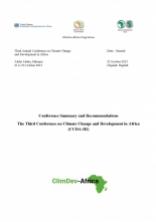Third Conference on Climate Change and Development in Africa (CCDA – III) conference summary report

CCDA-III objectives
The prime objective of CCDA III was to provide a forum for climate experts and the various stakeholders in development policy and practice to confer on how opportunities presented by climate change can be tapped to enhance Africa’s economic growth and development agenda. The conference delegates included researchers, climate scientists, development specialists, other stakeholders.
Secondly, CCDA-III sought to explore avenues for the mainstreaming of best practice, based on empirical and scientific assessments, in the development of national, regional and continental policies for strategies that respond to the impact of climate change and to promote dialogue between the main constituencies.This was on the understanding that policymakers need access to the best available science in order to craft effective responses to the local, national, regional and continental threats and opportunities that arise from the impacts of climate change.
Specific objectives
More specifically, CCDA-III sought to:
- Demonstrate empirical lessons from best practice in investments in climate science, data and analysis, as well as the multiplier benefits of such investments to African economies;
- Deliberate on the effectiveness of policies on climate resilience in Africa and the role and relevance of international, regional and national frameworks and contexts;
- Debate Africa’s transition to a green economy, especially clean energy access, low carbon development options, and climate finance;
- Deliberate on the relevance of the global climate change framework for Africa, how Africa needs to assert its development interests and influence on the global agenda, and whether Africa can find an alternative space to pursue its development goals.
Expected outcomes and outputs
The following results were expected at the end of CCDA III:
- Increased understanding of the role of climate science data and analysis in Africa’s development;
- Improved understanding by delegates of Africa’s risk factors and vulnerability, and the role of policy in promoting innovative adaptation and mitigation measures;
- A better understanding of policy, strategy and practice for creating green economy pathways and the role of clean energy can play in African development, and
- Strengthened professional networking to promote active debate on key issues and lay the foundation for more analytical work.
The following results were expected post-Conference:
- Improved investment opportunities in climate data and information management, policy analysis and implementation;
- Enhanced capacity of AU member-states to tap into climate finance opportunities, and
- Improved understanding of the global climate change framework and the key positions that Africa needs to take, within this framework, to enhance its development agenda.